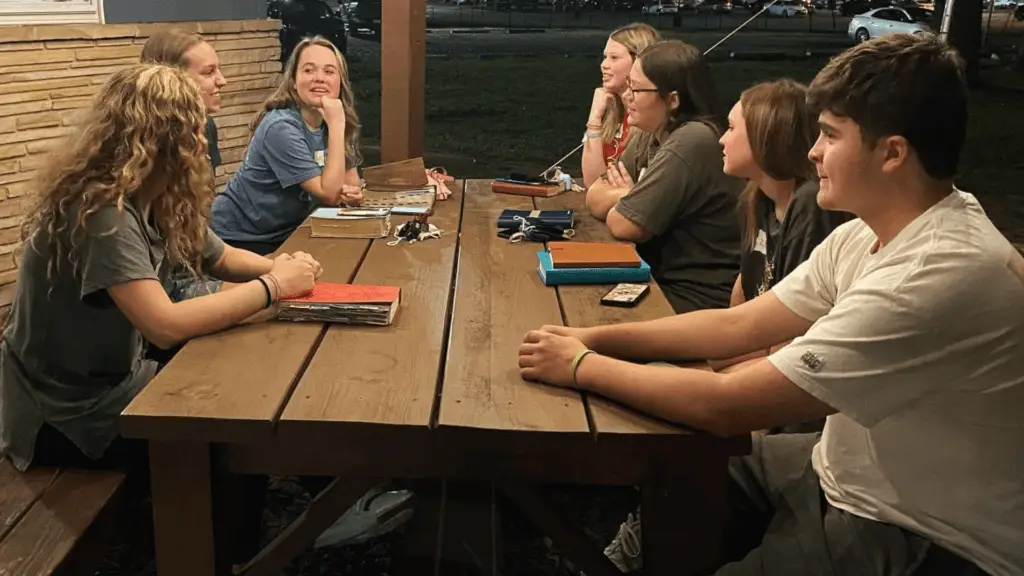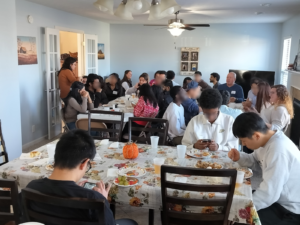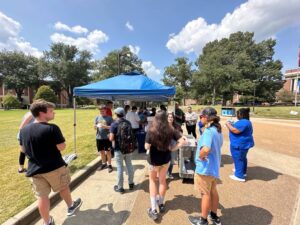Step into the kitchen with me for a minute. Can you check the spaghetti? Just throw some noodles against the wall to see if they’re ready. They stuck to the wall? Good, they’re done. Now pull the cake out of the oven and check it. Stick the toothpick in the top and pull it out – is it clean? It’s done as well. It is so good to have some clear indicators showing when our food is ready. As the college students that I have the pleasure to work with graduate, I often find myself wishing there were more concrete ways to discover whether they were “done” in terms of life readiness and discipleship.
I look at my seniors and thoughts go through my mind like, “I believe Sally has the spiritual maturity she needs to thrive out there. Michael, however, might need to go back in the oven.” Sometimes my evaluative thoughts are spot on and sometimes I miss it by a mile. Sharp Sally can drift. Meandering Michael can begin to show signs of being deeply rooted.
Now don’t get me wrong, I am not saying we are left with zero inputs about the spiritual readiness of our students. We may not have walls and toothpicks, but Jesus gives us some pretty clear indicators of maturing discipleship. John 13:35 and John 15:4,8 are a great help. Is this student adding to a “love one another” type of Christian community? Is this student bearing fruit in their life that reflects an ongoing abiding in Christ?
With this in mind, how do we in our first steps with freshmen (or first steps with any student) invest in a way that sees them graduate as loving and fruitful disciples? How do we begin with the end in mind? There are several mindsets that have been helpful to me as a discipler of students, and all have been borrowed from ministry mentors and heroes who have lived and communicated these better than I ever could. My church-based and campus-based college ministry friends are a pretty smart lot, so I apologize in advance if these seem like Captain Obvious type observations. You may already know these ideas, but to borrow a pretty cool phrase from Jesus, blessed are you if you do them.
It goes without saying that you cannot personally disciple every single student you encounter. Whether as an individual collegiate minister or working with a staff, I have tried to invest most of my discipling efforts in student leaders. Those student leaders need to learn and live a “spiritual multiplication” mindset in which they learn how to invest well in others (who will in turn invest well in others). I am indebted to Milt Hughes, who taught me this mindset when I was a freshman. As he was emphasizing and embodying 2 Timothy 2:2, I was captivated by the idea of ripples of influence touching lives that would create their own ripples of influence.
Roland “R.B.” Byrd is my former college minister and a continued mentor of mine who taught me often an intentionality mindset. R.B. loves the old adage, “If you aim at nothing you’re sure to hit it.” Without a doubt, “Where am I aiming?” is a huge question. But the next big question (especially if you embrace a spiritual multiplication mindset) is, “Do my students have a clear understanding of where we are aiming together?” On the local campus where I serve, we have emphasized our aim to be “after God’s heart, in community, and on mission.” We want our students to receive and extend discipleship that intentionally reflects God’s purposes and heart, is committed to our connectedness in the Body of Christ, and mobilizes students to live missional lives.
For students whom I’ve had the pleasure of investing in for all four years, we have been able to provide a bit of a steroid shot at the beginning and the end of their time on campus. (Okay, the steroid analogy is not the best, but stick with me here.) Offering a purposeful start, a consistent middle, and a strong ending of preparation and affirmation provides a consistency mindset that builds well on the intentionality mindset. Arliss Dickerson taught me practical and intentional strong on ramps and off ramps for transitioning students. On our campus, one of those “on ramps” is a six week training in leadership and discipleship (Freshman/Transfer Leadership Team) each fall, our best “off ramp” is a weekly “following Jesus post-college” Senior Bible Study in my home at the latter part of the Spring semester, and it is our aim to provide a consistency in our discipleship and encouragement for the years in between.
Bruce Leafblad was one of my professors in seminary and a regular reminder from him went something along the lines of, “As a minister, people will come to you often to draw from your well for spiritual encouragement. When they do so, will they find cobwebs or living water?” This don’t-neglect-your-own-well mindset has been invaluable to me over the years. Is my own personal walk with Jesus fresh and personal? How am I doing nurturing areas such as prayer, Sabbath rest, and testifying to the goodness of God? I have found that I always teach, disciple, and encourage best when I am passionate about the truth that I share. Limited passion often equals limited discipleship impact. When I am attentive to the well of my own heart, I am blessing myself and my students.
We are constantly saying good-bye and launching students. This is both hard and wonderful. One of those wonderful things is that it brings built-in safeguards against the illusion that our time with people is unlimited. We want to properly view the shorter long-haul of their time on campus to prepare them for the longer long-haul of walking with Jesus for life. The joy of being a minister to college students (along with these discipleship mindsets that friends have taught me) give a nice resonance to the truth of Romans 13:11, “And do this, understanding the present time: The hour has already come for you to wake up from your slumber, because our salvation is nearer now than when we first believed.”
Darrell Cook is the Senior Campus Minister of the BCM at Virginia Tech. Follow them @bcmvt.






